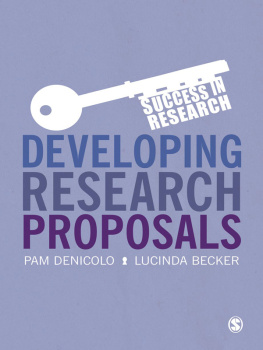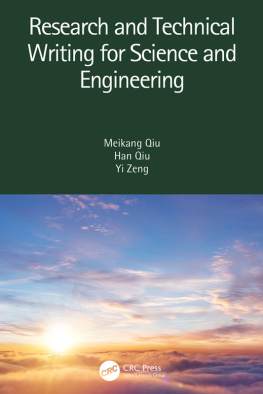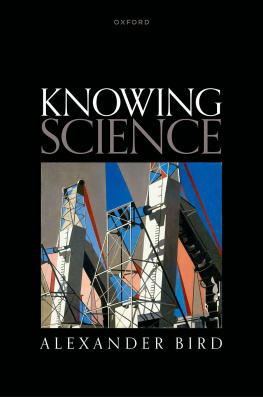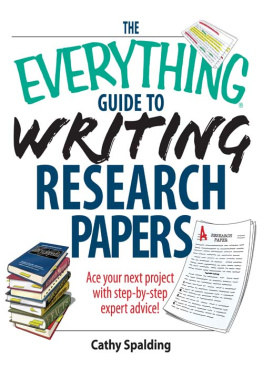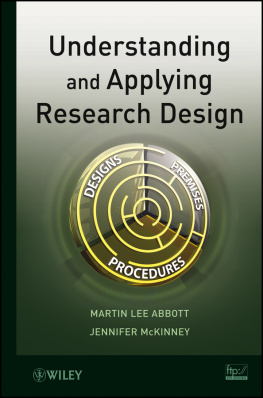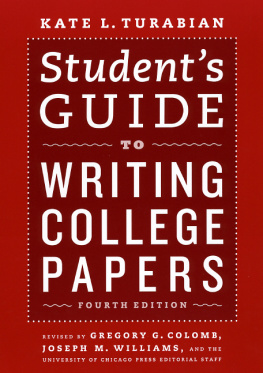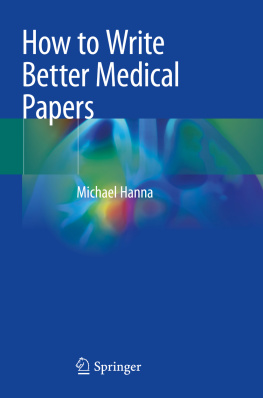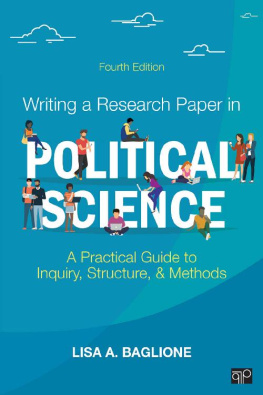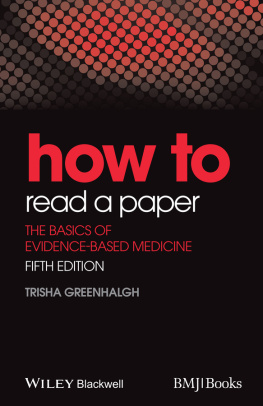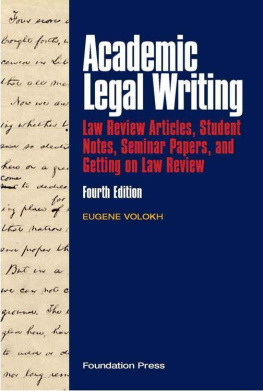1. Introduction
Writing plays many roles in science. We use it to record events and clarify our thinking. We use it to communicate to our colleagues, as we explain concepts and discuss our work. And we use it to add to scientific knowledge, by contributing to books, journals, and conference proceedings.
Unfortunately, many researchers do not write well. Bacons quote given above was made four hundred years ago, yet applies to much science writing today. Perhaps we should not always expect researchers to communicate well; surely the skills required for science and writing are different. But are they? The best science is based on straightforward, logical thinking, and it isnt rich, artistic sentences that we expect in a research paperwe expect readability. A scientist who can conceive of and explore interesting ideas in a rigorous way should be able to use much the same skills to solve the problem of how to explain and present those ideas to other people.
However, many researchers undervalue the importance of clarity, and underestimate the effort required to produce a high-quality piece of writing. Some researchers seem content to write badly, and perhaps havent considered the impact of poor writing on their readers, and thus on their own careers. A research paper can remain relevant for years or even decades and, if published in a major journal or conference, may be read by thousands of students and researchers. Everyone whose work is affected by a poorly written paper will suffer: ambiguity leads to misunderstanding; omissions frustrate; complexity makes readers struggle to reconstruct the authors intention.
Effort used to understand the structure of a paper or the syntax of its sentences is effort not used to understand its content. And, as the proverb tells us, no tale is so good that it cant be spoiled in the telling. Irrespective of the importance and validity of a paper, it cannot be convincing if it is difficult to understand. The more important the resultsor the more startling or unlikely they seemthe better the supporting arguments and their presentation should be. Remember that, while you have months or years to prepare your work, reviewers and examiners often have no more than hours and may have rather less. You need to help them to spend their time well.
For writing about science to be respected, a researcher must have something of value to say. A paper or thesis reports on research undertaken according to the norms of the field, to a standard that persuades a skeptical reader that the results are robust and of interest. Thus the written work rests on a program of activity that begins with interesting questions and proceeds through a sound methodology to clear results.
Few researchers are instinctive writers, and few people are instinctive researchers. Yet it is not so difficult to become a good writer. Those who do write well have, largely, learnt through experience. Inexperienced researchers can produce competent papers by doing no more than follow some elementary steps: create a logical organization, use concise sentences, revise against checklists of possible problems, seek feedback. Likewise, the skills of research must be learnt, and early attempts at investigation and experimentation are often marked by mistakes, detours, and fumbling; but, as for writing, competent work can be produced by appreciating that there is a more or less standard template that can be followed, and then using the template to produce a first research outcome.
Most researchers find that their work improves through practice, experience, and willingness to continue to reflect and learn. This observation certainly applies to me. Ive continued to develop as a writer, and today produce text much more quicklyand with better resultsthan when I wrote the second edition a decade ago. Im also a better scientist, and, looking back just a few years, am aware of poor research outcomes that are due to mistakes I would not make today. In my experience, most scientists develop a great deal as they proceed through their careers.
Kinds of Publication
Scientific results can be presented in a book, a thesis, a journal article, a paper or extended abstract in a conference or workshop proceedings, or a manuscript. Each kind of publication has its own characteristics. Booksthe form of publication that undergraduates are the most familiar withare usually texts that tend not to contain new results or provide evidence for the correctness of the information they present. The main purpose of a textbook is to collect information and present it in an accessible, readable form, and thus textbooks are generally better written than are papers.
The other forms of publication are for describing the outcomes of new research. A thesis is usually a deepor even definitiveexploration of a single problem. Journals and conference proceedings consist of contributions that range from substantial papers to extended abstracts. A journal paper is typically an end product of the research process, a careful presentation of new ideas that has been revised (sometimes over several iterations) according to referees and colleagues suggestions and criticisms.
A paper or extended abstract in conference proceedings can likewise be an end-product, but conferences are also used to report work in progress. Conference papers are usually refereed, but with more limited opportunities for iteration and revision, and may be constrained by strict length limits. There is no universal definition of extended abstract, but a common meaning is that the detail of the work is omitted. That is, an extended abstract may review the results of a research program, but may not include enough detail to make a solid argument for the claims.
In contrast to bookswhich can reflect an authors opinions as well as report on established scientific knowledgethe content of a paper must be defended and justified. This is the purpose of reviewing: to attempt to ensure that papers published in a reputable journal or conference are trustworthy, high-quality work. Indeed, in a common usage a published paper is distinguished from a mere paper by having been refereed.
A typical research paper consists of the arguments, evidence, experiments, proofs, and background required to support and explain a central hypothesis. In contrast, the process of research that leads to a paper can include uninteresting failures, invalid hypotheses, misconceptions, and experimental mistakes. With few exceptions these do not belong in a paper. While a thesis might be more inclusive, for example if the author includes a critical reflection on how the work developed over the course of a Ph.D., such material would usually be limited to mistakes or failures that are genuinely illuminating. A paper or thesis should be an objective addition to scientific knowledge, not a description of the path that was taken to the result. Thus style is not just about how to write, but is also about what to say.
Writing, Science, and Skepticism
Science is a system for accumulating reliable knowledge. Broadly speaking, the process of science begins with speculation, observation, and a growing understanding of some idea or phenomenon. This understanding is used to shape research questions, which in turn are used to develop hypotheses that can be tested by proof or experimentation. The results are described in a paper, which is then submitted for independent review before (hopefully) being published; or the results are described in a thesis that is then submitted for examination.


